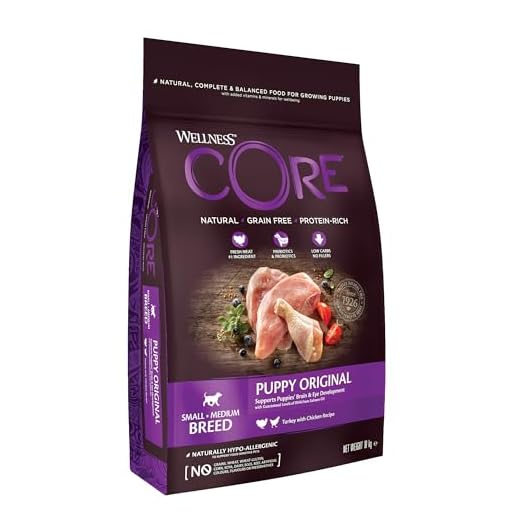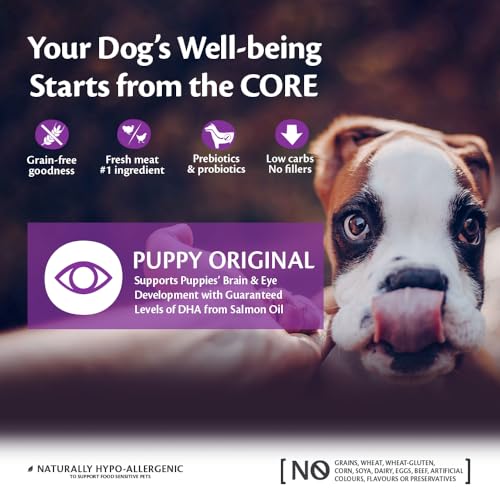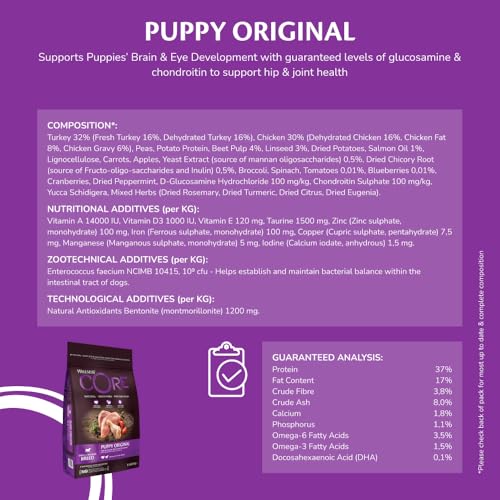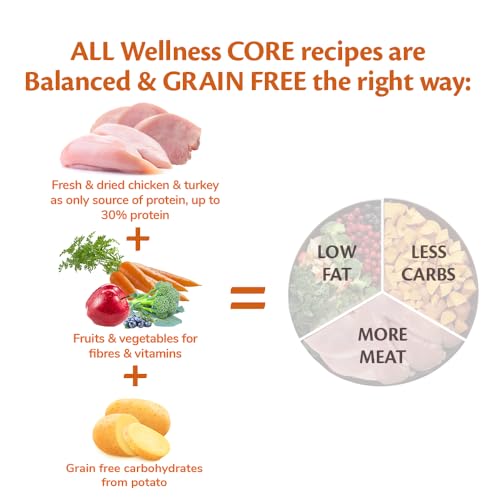




As a proud owner of a Bichon Frise puppy, I understand the importance of providing the best nutrition for these delightful little companions. Their fluffy white coats, playful demeanour, and boundless energy make them a joy to have around, but they also come with specific dietary needs that must be met to ensure their healthy growth and development. Choosing the right dog food can make all the difference in maintaining their health, vitality, and exuberance.
In my quest to find the best food for my Bichon Frise puppy, I delved into various brands, ingredients, and nutritional guidelines. I discovered that not all dog foods are created equal, and what works for one breed may not be suitable for another. Bichon Frise puppies have sensitive stomachs and specific nutritional requirements, including the need for high-quality protein, healthy fats, and essential vitamins and minerals. It’s crucial to select a food that supports their unique needs and helps them thrive.
Through careful research and consultation with veterinarians, I’ve compiled a comprehensive guide to the best dog food options for Bichon Frise puppies. This guide covers everything from the ideal nutrient composition to the top brands that cater specifically to small breeds. Whether you’re a new puppy parent or looking to switch your current food to something better, this article aims to provide you with the information you need to make an informed decision. Let’s explore the best choices to keep your Bichon Frise puppy happy, healthy, and full of life.
The Importance of Proper Nutrition for Bichon Frise Puppies
Ensuring that Bichon Frise puppies receive the right nutrition is essential for their growth and development. As a proud owner, I know firsthand how critical it is to provide a balanced diet that supports their unique needs. Proper nourishment not only promotes healthy growth but also helps prevent common health issues that can arise in this breed.
One of the main reasons nutrition is so vital for Bichon Frise puppies is their predisposition to certain health conditions. These adorable pups are prone to allergies, dental problems, and skin issues. A well-balanced diet can help mitigate these risks by providing essential nutrients that strengthen their immune system, support healthy skin and coat, and maintain strong teeth and bones.
Key Nutritional Components for Bichon Frise Puppies
When selecting food for my Bichon Frise puppy, I focus on several critical components to ensure their diet is complete and balanced.
- Protein: High-quality protein sources, such as chicken, fish, or lamb, are crucial for muscle development and energy.
- Fats: Healthy fats, including omega-3 and omega-6 fatty acids, support brain development, healthy skin, and a shiny coat.
- Carbohydrates: Complex carbohydrates from sources like brown rice and sweet potatoes provide sustained energy.
- Vitamins and Minerals: Essential vitamins and minerals, such as calcium, phosphorus, and vitamin D, are necessary for bone health and overall growth.
Choosing the right food also means being mindful of potential allergens. Many Bichon Frise puppies are sensitive to common ingredients like grains, so I often opt for grain-free options to avoid digestive issues and allergic reactions.
In summary, the nutritional needs of Bichon Frise puppies are unique and require careful attention. By providing a balanced diet rich in essential nutrients, we can help ensure our furry friends grow up healthy, happy, and full of life. As their caregivers, it’s our responsibility to make informed choices about their diet, setting the foundation for a long and vibrant life.
Essential Nutrients for Your Bichon Frise Puppy
When it comes to raising a healthy Bichon Frise puppy, understanding their nutritional needs is paramount. These fluffy companions require a balanced diet rich in specific nutrients to support their growth and overall well-being. It’s important to select food that meets these needs to ensure your puppy thrives.
Choosing the right food for your Bichon Frise puppy can be daunting with so many options available. However, focusing on key nutrients can simplify the process and help you make informed decisions. Here are the crucial nutrients that should be part of your puppy’s diet.
Critical Nutrients for Optimal Growth
-
Protein: Essential for growth and muscle development, protein should be a significant component of your puppy’s diet. Look for high-quality sources such as chicken, lamb, or fish to ensure they get the necessary amino acids.
-
Fats: Healthy fats are vital for brain development, energy, and a shiny coat. Ingredients like fish oil and chicken fat provide omega-3 and omega-6 fatty acids, which are beneficial for your Bichon Frise puppy.
-
Carbohydrates: While not as crucial as protein and fat, carbohydrates provide a necessary energy source. Opt for whole grains and vegetables like sweet potatoes and brown rice to offer sustained energy and support digestive health.
-
Vitamins: These are crucial for metabolic functions, immune support, and overall growth. Vitamins A, D, E, and B-complex should be included in their diet through natural ingredients like fruits and vegetables.
-
Minerals: Calcium and phosphorus are particularly important for bone and teeth development. Ensure your puppy’s food has a balanced ratio of these minerals, along with others like zinc and magnesium, for overall health.
-
Fibre: A moderate amount of fibre aids digestion and helps maintain a healthy weight. Ingredients like beet pulp and chicory root can be beneficial in promoting digestive health.
By ensuring your Bichon Frise puppy’s diet includes these essential nutrients, you can help them develop into a healthy and active adult. Always consult with your vet to tailor their diet to specific needs and monitor their growth and health regularly.
Choosing the Perfect Dog Food for Your Bichon Frise Puppy
Finding the right nutrition for your Bichon Frise puppy is crucial to their health and development. With so many options available, it can be overwhelming to make the best choice. In this guide, I’ll share what I’ve learned about selecting the ideal food for these charming little dogs.
When selecting food for my Bichon Frise puppy, I realised that their small size and unique dietary needs required special attention. Ensuring a balanced diet that supports growth, maintains energy, and keeps their coat shiny is essential for their overall well-being.
Key Factors to Consider
High-Quality IngredientsThe first thing I look for is high-quality ingredients. Foods with real meat as the first ingredient are preferred. Avoid products with fillers like corn, wheat, and soy, which can cause allergies and digestive issues in Bichon Frise puppies.
Appropriate Protein and Fat LevelsProtein and fat are vital for a puppy’s development. I choose foods with a protein content of around 22-28% and a fat content of 12-18%. This ensures they get the energy they need without excessive calories that could lead to weight issues.
Omega Fatty AcidsBichon Frises have a beautiful, fluffy coat that needs to be maintained. Foods rich in omega-3 and omega-6 fatty acids help keep their skin healthy and their fur soft and shiny. Ingredients like fish oil and flaxseed are excellent sources of these nutrients.
Small Kibble SizeThe size of the kibble is also important. Small breeds like Bichon Frises have tiny mouths, so I opt for foods with small, manageable kibble pieces that are easier for them to chew and digest.
Avoid Artificial AdditivesI avoid foods with artificial colours, flavours, and preservatives. These additives can cause adverse reactions and are unnecessary. Natural preservatives like vitamin E and vitamin C are much better alternatives.
Feeding Schedule and Portion Control
- Feed your puppy 3-4 times a day to maintain their energy levels.
- Follow the feeding guidelines on the food package, adjusting as necessary based on your puppy’s growth and activity level.
- Monitor your puppy’s weight and body condition regularly to ensure they are not overeating or underfeeding.
By considering these factors, I ensure my Bichon Frise puppy gets the nutrition they need for a healthy start in life. Each puppy is unique, so it’s essential to observe how they respond to their diet and make adjustments as needed. Consulting with a veterinarian can also provide personalised recommendations tailored to your puppy’s specific needs.
Wet vs. Dry Dog Food: What’s Best for Bichon Frise Puppies?
When it comes to feeding Bichon Frise puppies, choosing between wet and dry food can be a significant decision. Each type has its advantages and drawbacks, making it essential to understand which option aligns better with the specific needs of this breed.
Bichon Frise puppies, known for their fluffy coats and lively personalities, require a balanced diet to support their growth and overall health. As a pet owner, I have explored both wet and dry dog food to determine which one suits these adorable puppies best.
Wet Dog Food: Pros and Cons
- Hydration: Wet food contains a higher moisture content, which can be beneficial for puppies that do not drink enough water.
- Palatability: The rich aroma and flavour of wet food often make it more appealing, encouraging picky eaters to consume their meals.
- Digestibility: The soft texture of wet food can be easier for puppies to chew and digest, especially during their teething phase.
- Shelf Life: Once opened, wet food needs to be consumed quickly or refrigerated, which can be less convenient than dry food.
Dry Dog Food: Pros and Cons
- Dental Health: The crunchy texture of dry kibble helps in reducing plaque and tartar buildup, promoting better dental health.
- Convenience: Dry food is easier to store and measure, making it a more practical choice for busy pet owners.
- Nutritional Density: Dry kibble often has a more concentrated nutrient profile, providing essential vitamins and minerals in smaller portions.
- Cost: Typically, dry dog food is more cost-effective compared to wet food, offering better value for long-term feeding.
Making the Right ChoiceUltimately, the decision between wet and dry dog food for Bichon Frise puppies depends on individual preferences and specific health needs. Some owners may opt for a mixed feeding approach, combining both wet and dry food to balance hydration, palatability, dental health, and convenience. Consulting with a veterinarian can also provide tailored recommendations based on the puppy’s growth stage and overall health.
In conclusion, both wet and dry dog food have their unique benefits for Bichon Frise puppies. By understanding these advantages and considering the puppy’s individual needs, pet owners can make an informed decision that supports their furry friend’s health and happiness.
Best Dog Food Brands for Bichon Frise Puppies
As a devoted pet owner, ensuring my Bichon Frise puppy gets the best nutrition is a top priority. These little bundles of joy need a diet that supports their energetic lifestyle and sensitive digestive systems. After extensive research and consultations with veterinarians, I’ve compiled a list of the most highly recommended dog food brands tailored specifically for Bichon Frise puppies.
Each brand on this list has been selected based on its ingredient quality, nutritional balance, and positive reviews from other Bichon Frise owners. Whether you’re looking for grain-free options or recipes packed with wholesome ingredients, these brands have something to offer.
Recommended Brands
-
Royal Canin Bichon Frise Puppy
Royal Canin’s breed-specific formula is designed with the unique needs of Bichon Frise puppies in mind. The kibble size and shape are perfect for their small mouths, and the recipe includes essential nutrients to support healthy skin and coat, as well as digestive health.
-
Hill’s Science Diet Puppy Small Paws
Hill’s Science Diet is renowned for its scientifically-backed recipes. The Puppy Small Paws formula provides a balanced diet with high-quality protein, DHA from fish oil for brain and eye development, and a blend of antioxidants for a robust immune system.
-
Blue Buffalo Life Protection Puppy
Blue Buffalo’s Life Protection formula is packed with real meat, whole grains, and garden veggies. This recipe ensures your Bichon Frise puppy gets all the essential nutrients, including a healthy dose of omega-3 and omega-6 fatty acids for skin and coat health.
-
Wellness Complete Health Puppy
Wellness Complete Health offers a holistic approach to puppy nutrition. Their puppy formula includes high-quality proteins, DHA for cognitive development, and probiotics to support a healthy digestive system, making it an excellent choice for your Bichon Frise.
-
Orijen Puppy
Orijen Puppy is a premium option that focuses on biologically appropriate nutrition. This grain-free formula is rich in protein from free-run chicken and turkey, wild-caught fish, and cage-free eggs. It’s designed to meet the natural dietary needs of growing puppies.
Nutritious Homemade Meals for Bichon Frise Puppies
Creating homemade food for my Bichon Frise puppy has been a rewarding experience. Not only do I know exactly what my puppy is eating, but I can also tailor meals to meet his specific dietary needs. Bichon Frise puppies, with their small size and sensitive stomachs, benefit greatly from a balanced diet full of fresh ingredients.
When preparing meals at home, I focus on providing a mix of high-quality proteins, healthy fats, and essential vitamins. This ensures my puppy gets all the nutrients necessary for growth and development. I always consult with my vet to make sure the recipes are nutritionally complete and appropriate for my puppy’s age and activity level.
Homemade Recipes for Your Bichon Frise Puppy
Chicken and Vegetable DelightThis recipe is a favourite in our household. It’s simple to prepare and packed with nutrients.
- Ingredients:
- 1 cup of cooked chicken breast, shredded
- 1/2 cup of cooked carrots, finely chopped
- 1/2 cup of cooked peas
- 1/2 cup of cooked brown rice
- 1 tablespoon of olive oil
- Instructions:
- Combine all ingredients in a large bowl.
- Mix well until evenly distributed.
- Let it cool to room temperature before serving.
- Store leftovers in the refrigerator for up to three days.
Beef and Sweet Potato FeastThis dish provides a hearty meal that’s perfect for energetic puppies.
- Ingredients:
- 1 cup of cooked lean ground beef
- 1 cup of cooked sweet potatoes, mashed
- 1/2 cup of green beans, chopped
- 1 egg, cooked and chopped
- 1 teaspoon of fish oil
- Instructions:
- Mix all ingredients together in a bowl.
- Ensure the mixture is cool before feeding it to your puppy.
- Portion out meals according to your puppy’s size and appetite.
- Keep unused portions in the fridge for up to three days.
Turkey and Quinoa MixThis recipe is great for puppies with grain sensitivities, using quinoa as a nutritious alternative.
- Ingredients:
- 1 cup of cooked turkey, finely chopped
- 1/2 cup of cooked quinoa
- 1/2 cup of spinach, finely chopped
- 1/4 cup of blueberries, mashed
- 1 teaspoon of coconut oil
- Instructions:
- Combine the turkey, quinoa, spinach, and blueberries in a bowl.
- Add the coconut oil and mix thoroughly.
- Allow the food to cool before serving to your puppy.
- Refrigerate leftovers for up to three days.
These recipes are just a starting point. Feel free to adjust ingredients based on what’s available and your puppy’s preferences. Always introduce new foods gradually and monitor your Bichon Frise for any signs of allergies or digestive issues. Providing homemade meals can be a fulfilling way to ensure your puppy thrives on a healthy, balanced diet.
Common Feeding Errors and How to Prevent Them
Feeding a Bichon Frise puppy requires careful attention to nutritional needs and feeding habits. One of the most common mistakes new owners make is irregular feeding schedules. Puppies thrive on consistency, so it’s crucial to establish a regular feeding routine. I recommend feeding your Bichon Frise puppy at the same times each day, ideally two to three times, to maintain stable blood sugar levels and prevent digestive upset.
Another frequent error is overfeeding or underfeeding. Determining the right portion size can be tricky, but it’s essential for your puppy’s growth and development. I suggest following the feeding guidelines provided by your veterinarian or the dog food manufacturer based on your puppy’s age, weight, and activity level. Avoid the temptation to overfeed, as this can lead to obesity and related health issues later in life.
Here are a few more tips to avoid common feeding mistakes:
- Choosing the wrong type of food: Ensure you select a high-quality puppy food formulated for small breeds. Bichon Frises have unique dietary requirements that may differ from larger dogs.
- Not monitoring treats: While treats can be a valuable training tool, excessive treats can contribute to weight gain. Opt for healthy, small treats and consider them part of your puppy’s daily food intake.
- Ignoring changes in appetite: Be alert to any sudden changes in your puppy’s eating habits, as these could indicate an underlying health issue. Consult your vet if you notice prolonged loss of appetite or excessive hunger.
By avoiding these common pitfalls and staying attentive to your Bichon Frise puppy’s nutritional needs, you can help ensure they grow into a healthy, happy adult dog.
Signs of a Healthy Diet in Your Bichon Frise Puppy
Ensuring your Bichon Frise puppy is on a nutritious diet is crucial for their overall health and wellbeing. As a responsible owner, I keep a close eye on several indicators that tell me if my puppy’s diet is on track.
Firstly, one clear sign of a healthy diet is a shiny and smooth coat. When I stroke my Bichon Frise puppy, I look for a coat that gleams with vitality, indicating that their diet provides essential nutrients like omega fatty acids. These nutrients not only promote coat health but also contribute to skin hydration, preventing dryness and itchiness.
Additionally, I monitor my puppy’s energy levels. A well-fed Bichon Frise puppy should exhibit playful and energetic behaviour, showing enthusiasm during playtime and daily activities. This energy comes from a balanced diet that includes high-quality proteins and carbohydrates, ensuring they have the stamina and vitality typical of this breed.
Another vital aspect I observe is the condition of their stools. A healthy diet supports good digestion, leading to firm and regular stools. This consistency indicates that my puppy is absorbing nutrients efficiently and that their gastrointestinal system is functioning well.
Furthermore, I pay attention to their weight and growth rate. A properly nourished Bichon Frise puppy should maintain a steady growth trajectory without becoming overweight. Controlled growth ensures they develop strong bones and muscles, supporting their overall health as they mature.
Lastly, I regularly consult with my veterinarian to confirm that my puppy’s diet meets their specific nutritional needs. This professional guidance helps me adjust their diet as they grow and ensure they receive all essential vitamins and minerals for optimal health.
Frequently Asked Questions About Feeding Bichon Frise Puppies
Here are some common questions new Bichon Frise puppy owners often have about feeding:
What should I feed my Bichon Frise puppy?
- Choose a high-quality puppy food formulated for small breeds. Look for options that include real meat as the first ingredient and avoid artificial additives.
- Consider the unique needs of Bichon Frises, such as their tendency to develop allergies. Opt for grain-free or limited ingredient diets if your puppy shows signs of sensitivity.
How often should I feed my Bichon Frise puppy?
- Feed your Bichon Frise puppy three to four small meals a day up to the age of six months.
- After six months, you can reduce the number of meals to two or three a day, depending on your puppy’s appetite and activity level.
Can Bichon Frise puppies eat adult dog food?
No, it is not recommended to feed adult dog food to Bichon Frise puppies. Puppies have different nutritional requirements than adult dogs, particularly in terms of protein and calorie levels. Feeding adult food too early can lead to developmental issues.
How do I know if my Bichon Frise puppy is eating enough?
- Monitor your puppy’s weight gain and growth. A healthy Bichon Frise puppy should have a visible waist when viewed from above and a slight tuck-up in the belly.
- Consult your veterinarian if you have concerns about your puppy’s weight or appetite.
Should I give my Bichon Frise puppy treats?
- Yes, treats can be given to Bichon Frise puppies in moderation as rewards for good behavior or during training sessions.
- Choose treats that are small in size and specifically formulated for puppies to avoid overfeeding.
Conclusion:
Feeding your Bichon Frise puppy a balanced and nutritious diet is crucial for their health and development. By selecting the right food, monitoring their intake, and consulting with your veterinarian as needed, you can ensure your puppy grows into a healthy and happy adult.
Best Dog Food For Bichon Frise Puppies
Features
| Model | NPSC45830 |
| Size | 10 kg (Pack of 1) |
Features
| Part Number | HARRGSFCP-10 |
| Model | HARRGSFCP-10 |
| Release Date | 2024-01-01T00:00:01Z |
| Size | 10 kg (Pack of 1) |
Features
| Part Number | 12231703 |
| Model | 12531981 |
| Release Date | 2014-05-23T00:00:01Z |
| Size | 1 count (Pack of 1) |
| Publication Date | 2014-05-23T00:00:01Z |
| Price history for Beta Puppy Dry Dog Food - Chicken | |
|---|---|
|
Latest updates:
|
|
Features
| Is Adult Product | |
| Release Date | 2025-05-17T00:00:01Z |
| Language | English |
| Number Of Pages | 213 |
| Publication Date | 2025-05-17T00:00:01Z |
Features
| Part Number | 10773 |
| Model | 10773 |
| Size | 10kg |
| Language | French |
Features
| Part Number | FTP15 |
| Model | 02SKFTP |
| Is Adult Product | |
| Release Date | 2011-04-14T00:00:01Z |
| Size | 1 count (Pack of 1) |
| Language | English |
Q&A:
What are the nutritional needs of a Bichon Frise puppy?
A Bichon Frise puppy requires a diet rich in high-quality protein, healthy fats, and essential vitamins and minerals to support their growth and development. Look for dog foods specifically formulated for small breed puppies to ensure they meet these nutritional needs.
Is grain-free food a good option for Bichon Frise puppies?
Grain-free food can be a good option for Bichon Frise puppies, especially if they have grain allergies or sensitivities. However, it’s important to choose a grain-free formula that provides a balanced diet with all necessary nutrients. Always consult your vet before making any significant changes to your puppy’s diet.
How often should I feed my Bichon Frise puppy?
Bichon Frise puppies should be fed 3-4 small meals a day to ensure they get enough nutrients and maintain stable energy levels. As they grow older, you can gradually reduce the feeding frequency to 2-3 meals per day.
What ingredients should I avoid in dog food for my Bichon Frise puppy?
Avoid dog foods that contain artificial preservatives, colours, and flavours. Also, steer clear of fillers like corn, soy, and wheat, which can be difficult for puppies to digest and may cause allergies. Opt for foods with natural, wholesome ingredients instead.
Can I give my Bichon Frise puppy homemade food?
Homemade food can be an option for Bichon Frise puppies, but it requires careful planning to ensure it meets all their nutritional needs. Consult your vet or a pet nutritionist to create a balanced diet plan. Commercial puppy foods are often more convenient and are specifically formulated to provide complete nutrition.









































